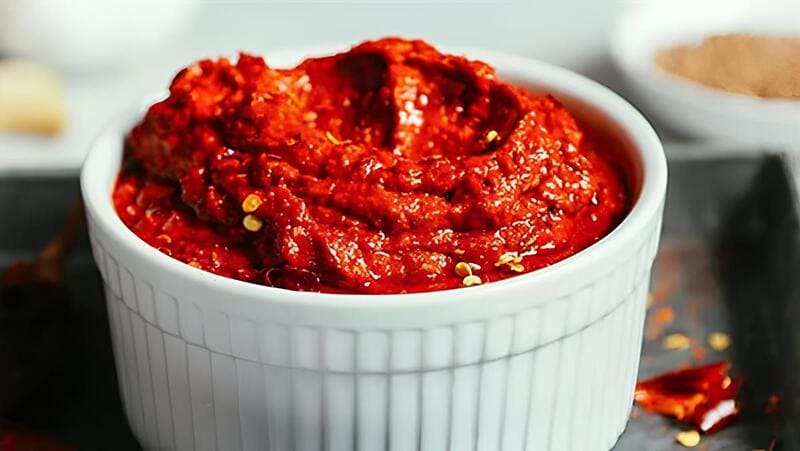
Egyptian Shatta, also known as spicy chili sauce, holds a special place in the hearts of spice lovers. This piquant condiment traces its roots back to ancient Arabic culinary traditions, enhancing a variety of dishes with its fiery kick.
The flavor profile of Egyptian Shatta is robust, featuring a harmonious blend of smoky, tangy, and savory notes. Made primarily from hot red peppers, this sauce is a versatile addition to any meal, perfect for those who crave an authentic Egyptian touch in their cuisine.
Ingredients
- 1 kilogram of hot red peppers
- 1/4 cup vinegar
- 4 tablespoons minced garlic
- 2 tablespoons salt
- 1 tablespoon paprika
- 1 tablespoon cumin
- 1 tablespoon coriander
- 1/2 cup water from boiled peppers
- 2 tablespoons olive oil or corn oil (for preservation)
Preparation
- Wash and drain the red peppers thoroughly. Remove the pepper heads, taking care to wear gloves to avoid burns.
- Boil a pot of water and add the peppers for a quick five-minute blanching.
- Drain the peppers and let them cool.
- Transfer the cooled peppers to a blender, add minced garlic, salt, paprika, cumin, coriander, and half a cup of the pepper boiling water.
- Blend until a smooth, thick paste forms.
- Add additional water if needed to achieve the desired consistency.
- Transfer the Shatta to a jar and top with two tablespoons of olive oil or corn oil to preserve freshness.
Did you know?
Egyptian Shatta isn’t just a modern-day favorite; it has a rich history dating back to ancient times. The use of hot peppers in Arabic cuisine is centuries old, linked to spice routes that brought diverse flavors from South Asia and the Americas. Shatta provides a hot and vibrant addition to dishes such as baba ghanoush, tahina, and grilled meats, transforming simple meals into gourmet experiences.
Interestingly, while Shatta is traditionally made with hot red peppers, variations include adding milder peppers to balance the heat. It’s not just a condiment but a seasoning that can be incorporated into marinades for fish, chicken, and even eggplant dishes. Preservation methods, like adding a layer of oil on top, allow this spicy sauce to stay fresh for over a year without refrigeration, echoing ancient practices of prolonging the shelf life of homemade sauces.
Thus, Egyptian Shatta isn’t merely a hot sauce; it’s a historical journey of flavors, a nod to the ingenuity of ancient culinary arts, and a versatile staple in Egyptian cuisine.
